Module3 Making plans 知识点讲解课件(共50张PPT)
文档属性
| 名称 | Module3 Making plans 知识点讲解课件(共50张PPT) |  | |
| 格式 | pptx | ||
| 文件大小 | 263.8KB | ||
| 资源类型 | 教案 | ||
| 版本资源 | 外研版 | ||
| 科目 | 英语 | ||
| 更新时间 | 2022-01-07 20:53:15 | ||
图片预览

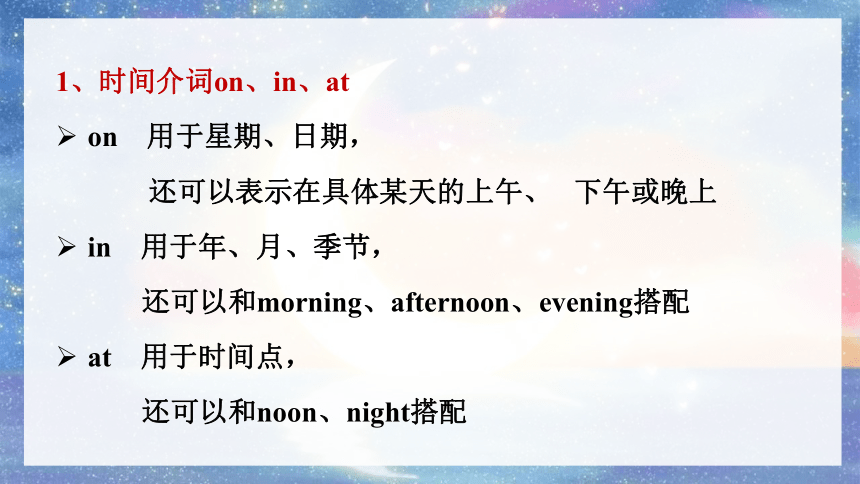
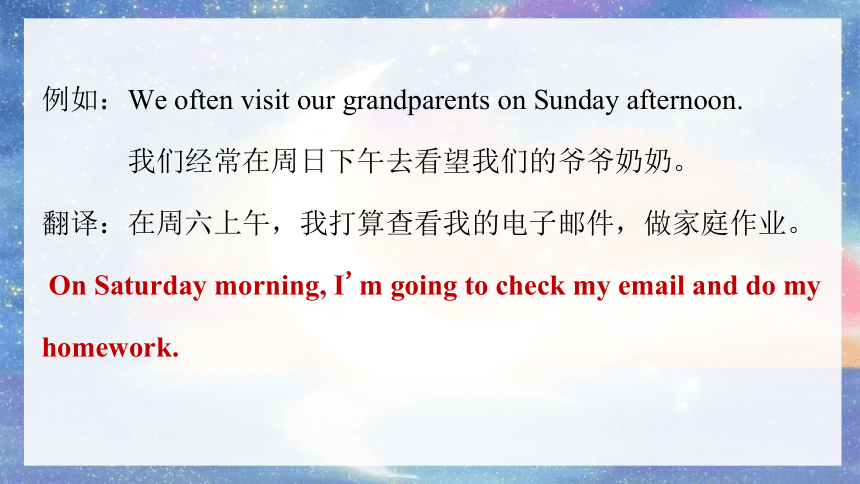
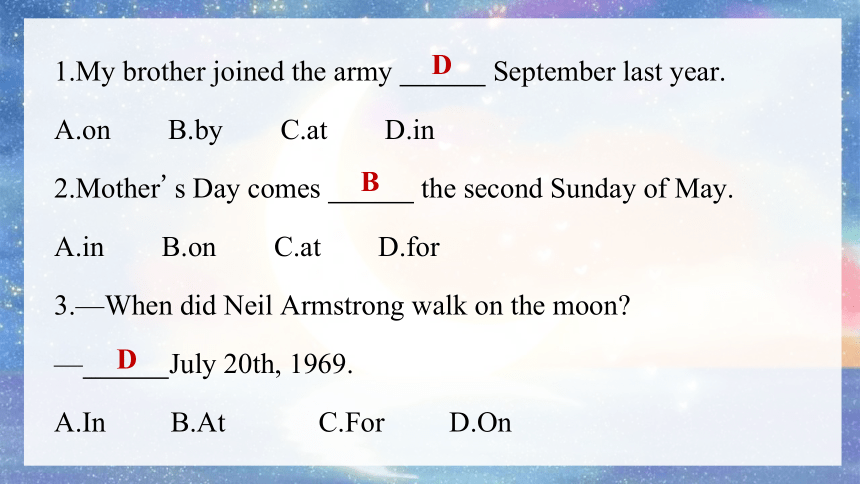
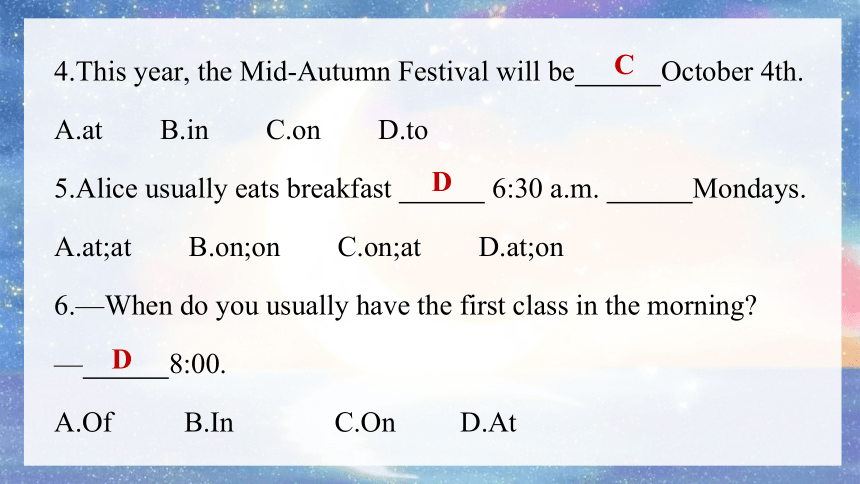
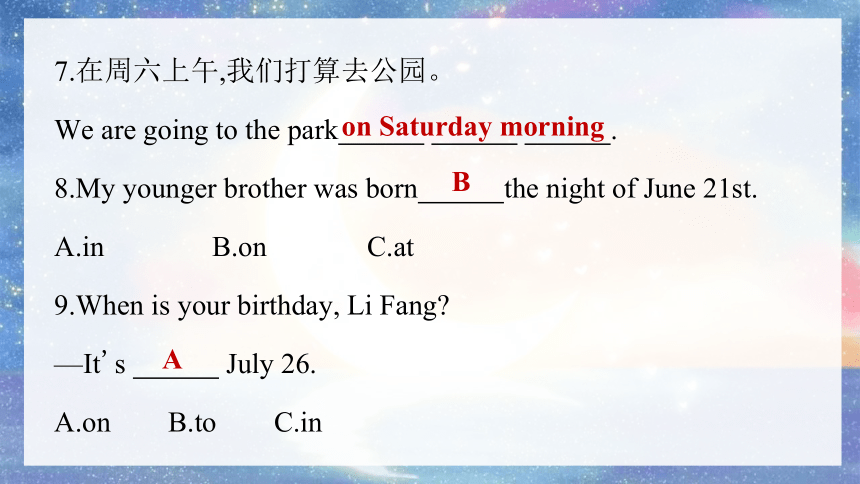
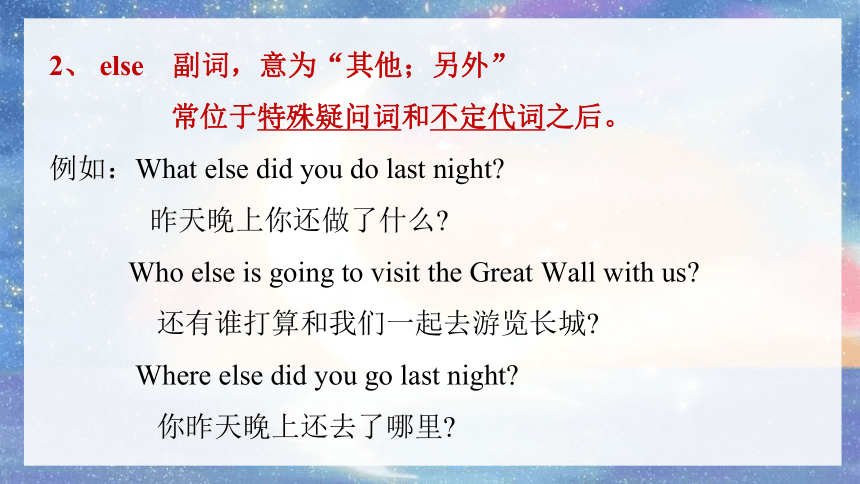
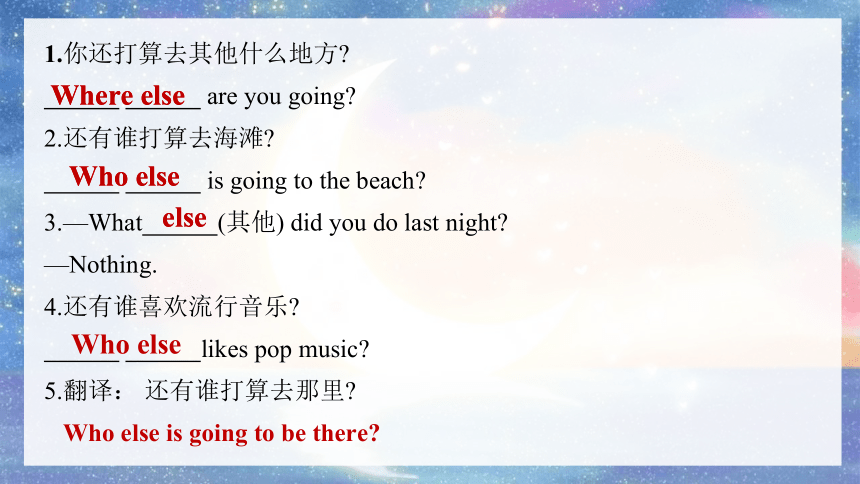
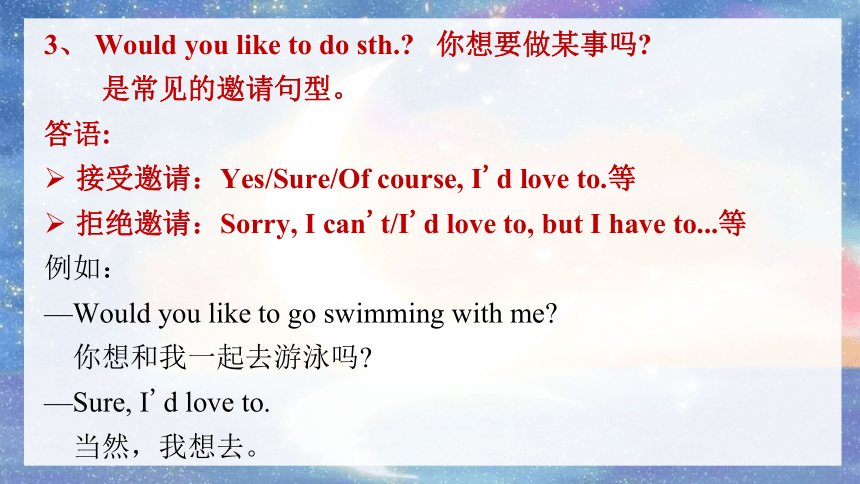
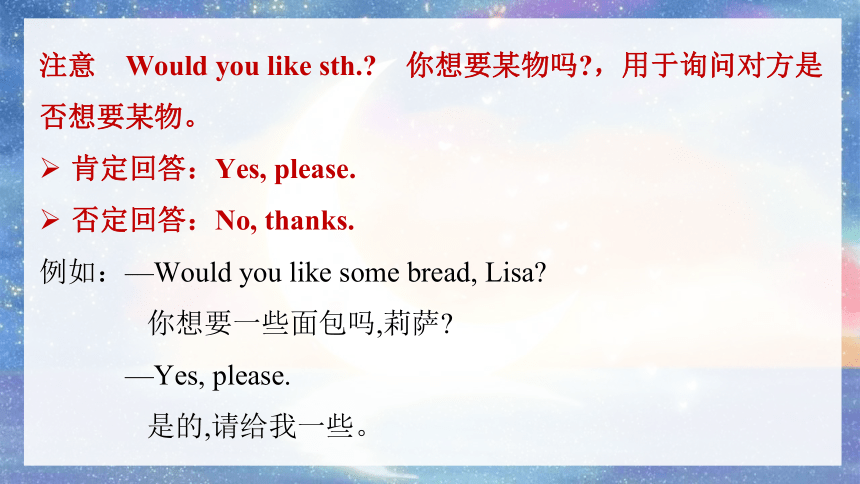
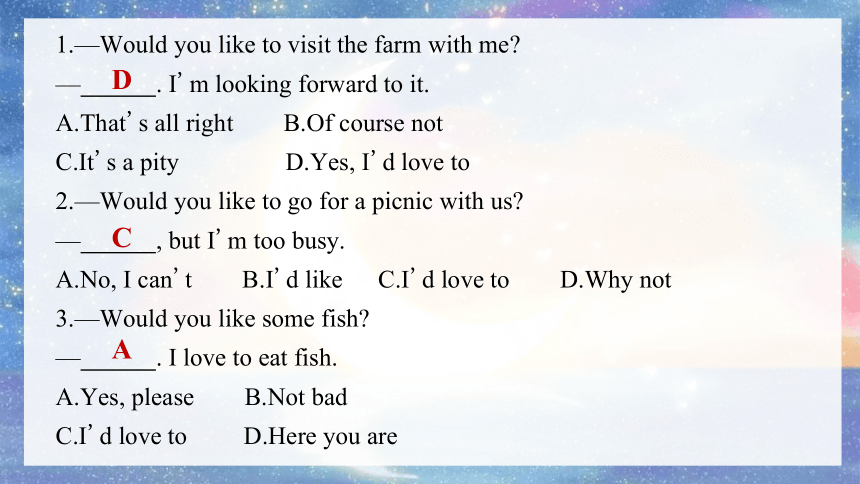
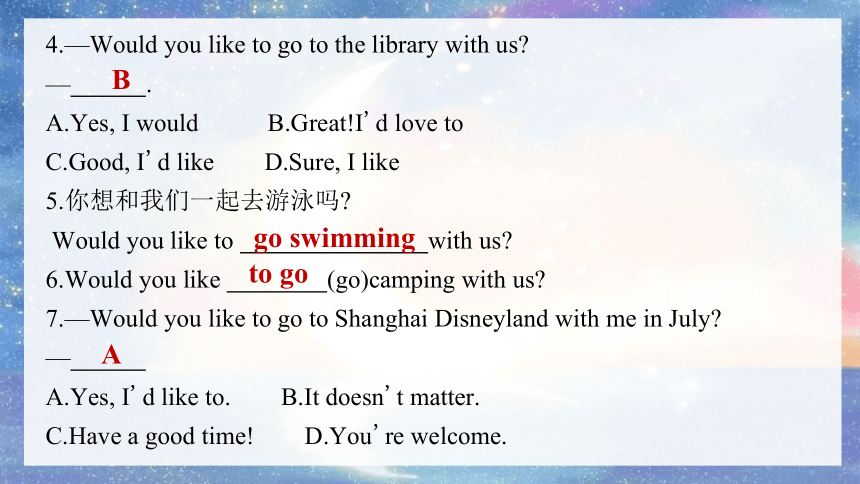
文档简介
(共50张PPT)
Module 3
Making plans
1、时间介词on、in、at
on 用于星期、日期,
还可以表示在具体某天的上午、 下午或晚上
in 用于年、月、季节,
还可以和morning、afternoon、evening搭配
at 用于时间点,
还可以和noon、night搭配
例如:We often visit our grandparents on Sunday afternoon.
我们经常在周日下午去看望我们的爷爷奶奶。
翻译:在周六上午,我打算查看我的电子邮件,做家庭作业。
On Saturday morning, I'm going to check my email and do my homework.
1.My brother joined the army September last year.
A.on B.by C.at D.in
2.Mother's Day comes the second Sunday of May.
A.in B.on C.at D.for
3.—When did Neil Armstrong walk on the moon
— July 20th, 1969.
A.In B.At C.For D.On
D
D
B
4.This year, the Mid-Autumn Festival will be October 4th.
A.at B.in C.on D.to
5.Alice usually eats breakfast 6:30 a.m. Mondays.
A.at;at B.on;on C.on;at D.at;on
6.—When do you usually have the first class in the morning
— 8:00.
A.Of B.In C.On D.At
C
D
D
7.在周六上午,我们打算去公园。
We are going to the park .
8.My younger brother was born the night of June 21st.
A.in B.on C.at
9.When is your birthday, Li Fang
—It's July 26.
A.on B.to C.in
B
A
on Saturday morning
2、 else 副词,意为“其他;另外”
常位于特殊疑问词和不定代词之后。
例如:What else did you do last night
昨天晚上你还做了什么
Who else is going to visit the Great Wall with us
还有谁打算和我们一起去游览长城
Where else did you go last night
你昨天晚上还去了哪里
1.你还打算去其他什么地方
are you going
2.还有谁打算去海滩
is going to the beach
3.—What (其他) did you do last night
—Nothing.
4.还有谁喜欢流行音乐
likes pop music
5.翻译: 还有谁打算去那里
Who else is going to be there
Where else
Who else
else
Who else
Where else
Who else
else
3、 Would you like to do sth. 你想要做某事吗
是常见的邀请句型。
答语:
接受邀请:Yes/Sure/Of course, I'd love to.等
拒绝邀请:Sorry, I can't/I'd love to, but I have to...等
例如:
—Would you like to go swimming with me
你想和我一起去游泳吗
—Sure, I'd love to.
当然,我想去。
注意 Would you like sth. 你想要某物吗 ,用于询问对方是否想要某物。
肯定回答:Yes, please.
否定回答:No, thanks.
例如:—Would you like some bread, Lisa
你想要一些面包吗,莉萨
—Yes, please.
是的,请给我一些。
1.—Would you like to visit the farm with me
— . I'm looking forward to it.
A.That's all right B.Of course not
C.It's a pity D.Yes, I'd love to
2.—Would you like to go for a picnic with us
— , but I'm too busy.
A.No, I can't B.I'd like C.I'd love to D.Why not
3.—Would you like some fish
— . I love to eat fish.
A.Yes, please B.Not bad
C.I'd love to D.Here you are
D
C
A
4.—Would you like to go to the library with us
— .
A.Yes, I would B.Great!I'd love to
C.Good, I'd like D.Sure, I like
5.你想和我们一起去游泳吗
Would you like to with us
6.Would you like (go)camping with us
7.—Would you like to go to Shanghai Disneyland with me in July
—
A.Yes, I'd like to. B.It doesn't matter.
C.Have a good time! D.You're welcome.
B
A
go swimming
to go
8.—Lingling and I are going to have a picnic. Would you like to join us
— .
A.That's all right B.Not at all
C.Thank you D.Yes,I'd love to
9.你想和我们一起去观光吗
Would you like to with us
10.我想去澳大利亚观光。
I'd like to in Australia.
11.翻译:你想加入我们吗
Would you like to join us
D
go sightseeing
go sightseeing
4、go over 复习
例如:Let's go over the text again.
让我们把课文再复习一遍。
I'm going to go over my lessons this afternoon.
今天下午我打算复习功课。
1.你想和我一起复习功课吗
Would you like to lessons with me
2.我想要莉萨帮我复习功课。
I want Lisa to help me the lessons.
3.I'm going to g over lessons this Sunday.
4.你能帮我复习功课吗
Can you help me my lessons
go over
go over
go
go over
5、look forward to 盼望;期待,to为介词,后接名词、代词或动名词
例如:They are looking forward to seeing the movie again.
他们期待再次观看那部电影。
翻译:我期待着明天的足球赛。
I'm looking forward to the football match tomorrow.
1.The boys are looking forward swimming tomorrow afternoon.
A.go B.to going C.to go D.going
2.We all look forward to you again soon.
A.see B.seeing C.seen
3.我和我的妹妹都盼望着去迪士尼乐园。
My sister and I are to Disneyland.
B
B
looking forward to going
4.我们期待再次见到你。
We you again.
5.I'm looking f to our summer vacation.
6.我儿子盼望着有自己的房间。
My son is looking forward to having a room of his own.
are looking forward to seeing
forward
7.孩子们总是盼望着春节。
Children always the Spring Festival.
8.We are looking forward to (see)you again.
9.Betty is looking forward to Disneyland with her parents.
A.go to B.going to
C.goes to D.to go to
look forward to
seeing
B
6、cheer 动词,意为“为……喝彩”
例如:They went to the playground and cheered the players.
他们去操场为运动员们喝彩了。
翻译:我们打算为运动员们喝彩。
We're going to cheer the players.
短语:cheer up 使变得更高兴;振奋起来
例如:Let's do something to cheer him up.
让我们做一些事情使他振奋起来吧。
1.Jack is going to [t ] his favourite football team this weekend.
2.We are going to the playground to (为……喝彩) the runners.
3.他们打算为运动员们加油。
They are going to cheer the players.
4.他看起来很难过。让我们使他振作起来吧。
He looks very sad. Let's .
5.Let's go to the playground to (为……喝彩)all the runners.
6.They are going to (为……喝彩)the runners.
cheer
cheer
cheer him up
cheer
cheer
7、enjoy oneself 过得愉快;玩得开心
=have fun= have a good/great/wonderful time
例如:We enjoyed ourselves last night.
我们昨天晚上玩得很开心。
enjoy doing sth. 喜欢做某事,enjoy后跟动词-ing形式。
例如:I enjoy collecting stamps.
我喜欢收集邮票。
1.Look! The people on the beach are enjoying very much.
A.ourselves B.them C.ours D.themselves
2.People enjoy zongzi on the Dragon Boat Festival.
A.eat B.eating C.to eat
3.昨天晚上你玩得开心吗
Did you last night
D
B
have fun/enjoy yourself
/have a good time
4.Welcome you all to Guangyuan and enjoy here.
A.you B.your C.yourselves
5.我希望你们能玩得开心。
I hope you can enjoy yourselves.
6.Lisa enjoyed (her)playing in the water.
C
herself
7.—I'm going to Lisa's birthday party this evening.
— . It must be so much fun.
A.What a pity B.Enjoy yourself
C.I'm sorry to hear that D.Don't be silly
8.Lily enjoys a film at the weekend.
A.see B.to see C.seeing
9.The journey was a little boring. We didn't enjoy (we) at all.
10.翻译:我要在五一假期好好玩一玩。
I'm going to enjoy myself during the May Day holiday.
B
C
ourselves
8、反身代词:当主语和宾语一致时,宾语要用反身代词,表示“……自己
例如:I learned English by myself. 我自学了英语。
反身代词:
单数:myself 我自己;yourself 你自己;
himself 他自己;herself 她自己;itself 它自己
复数:ourselves 我们自己;yourselves 你们自己;
themselves 他/她/它们自己
反身代词短语
enjoy onself 玩得开心
teach onself=learn ... by oneself 自学
help onself 别客气;随便吃/喝……
1.Last week, the students went skating and enjoyed (they)very much.
2.—Dad, could you please teach English
—Sure!But it's more important to learn it by .
A.my;yourself B.my;you
C.me;you D.me;yourself
3.Nobody taught the old lady how to use WeChat. She learned it all by .
A.she B.her C.herself D.hers
themselves
D
C
4.“A miss is as good as a mile,” I often say to (I).
5.—She is too busy to help us finish the work.
—Let's do it .
A.herself B.myself
C.itself D.ourselves
myself
D
9、辨析:something, anything, nothing, everything
something 某事;某物,多用在肯定句中,也可以用在表示邀请、请求或期望得到肯定回答的疑问句中
anything 某事物,通常用在疑问句中;还可以用在否定句中表示“任何事物;任何东西”
nothing 否定词,没有任何东西;没有事=not...anything
everything 每件事物;所有事物
例句:
I have something to tell you.我有事情要告诉你。
Would you like something to eat 你想吃点东西吗
I can't find anything.我什么也找不到。
Is there anything I can do for you 我能为你做点什么吗
Nothing is impossible.没有什么事情是不可能的。
Everything is fine.一切都好。
1.They said that they could not see in the dark.
A.something B.nothing C.everything D.anything
2. I can hardly eat . I am not feeling well today.
A.nothing B.anything C.everything D.something
3.—Do you love your parents
—Yes, of course. in my life is more important than them.
A.Something B.Anything C.Everything D.Nothing
D
B
D
4.Please listen to the teacher carefully. She has important to tell us.
A.something B.everything C.anything D.nothing
5.A smile costs , but gives much, so always keep smiling!
A.something B.anything C.nothing
6.Could you stay a little longer I have more to tell you about the plan for tomorrow.
A.something B.everything C.anything D.nothing
A
C
A
7.We had fun and learnt new as well. We had a good time.
A.something B.anything C.nothing D.everything
8.There is (没有东西) in the bottle. It is empty.
9.There is nothing in the room. (改为同义句)
There in the room.
10. Look! The bowl is empty. There's in it!
A.something B.anything C.nothing D.everything
A
C
nothing
isn't anything
10、辨析:win, beat
win 赢得,宾语是比赛、竞赛、奖牌、奖品等,
通常和match、competition、game、medal、prize等搭配。
如:Which team will win the football match
哪个队会赢得足球赛
beat 打败,宾语是对手,和表示人、球队等的词搭配。
如:We beat them at chess.我们下棋赢了他们。
1.She can speak English very well, so we are sure she can first prize.
A.win B.beat C.lose D.miss
2.I think you can w the competition because you can sing very well.
3.Mike will the chess game because he is good at playing chess.
A.win B.lose C.beat D.catch
4.Mary wants to (赢)this match.
5.She sings very well. I'm sure she can (赢得)the singing competition.
6.I will get the first prize of the competition. I will be the (win).
A
A
win
win
win
winner
11、一般将来时:be going to
1.be going to do sth. 打算做某事,表示主观上打算、准备在最近或将来要做某事。
2.be going to后接动词原形,与表示将来的时间状语连用,
如:tonight、this evening/afternoon、tomorrow morning
/afternoon/evening、the day after tomorrow、next week/month
/year等。
肯定句 主语+be going to+动词原形+其他.
否定句 主语+be not going to+动词原形+其他.
一般疑问句 Be+主语+going to+动词原形+其他
肯定回答 Yes,主语+be.
否定回答 No,主语+be not.
特殊疑问句 特殊疑问词+be+主语+going to+动词原形+其他
3.be going to的句式变化
例句:
They are going to visit the Great Wall tomorrow.
他们打算明天去参观长城。
He is not going to do anything this afternoon.
今天下午他不打算做任何事情。
Are you going to play football this Saturday
你们打算这个星期六去踢足球吗
When are they going to have the class meeting
他们打算什么时候开班会
1.We a School Show next month.
A.have B.will having
C.are going to have D.are going to having
2.—What is your plan for next weekend, Lingling
—I volunteer work in the museum.
A.was doing B.did C.have done D.am going to do
3.—What are you going to do on Sunday
—
A.I'm watching TV at home now.
B.I'm going to visit Lily.
C.I like to go to the cinema.
D.I often do my homework at home.
C
D
B
4.— are you going to do tomorrow
—I am going to visit Hefei Wildlife Park.
A.What B.Where C.Why D.When
5.We are going (visit)the Summer Palace this afternoon.
6.— are you going to do this weekend
—We are going to play tennis.
A.When B.Where C.What D.How
A
C
to visit
7.他们打算去看电影。
They see a movie.
8.你打算查看你的电子邮件吗
Are you your email
9.我妹妹打算今天下午去上钢琴课。
My sister to have this afternoon.
are going to
going to check
is going a piano lesson
10.They are going (swim)this afternoon.
11.你今天下午打算和他们一起打网球吗
play tennis with them this afternoon
12.你打算在哪里过你的暑假
Where are you going to
13.We are going to have a school trip after the exam. (改为否定句)
We going to have a school trip after the exam.
swimming
Are you going to
spend your summer holiday
are not
14.Are you going to do your homework after school (作肯定回答)
, I .
15.He is going to have a picnic on the beach. (对画线部分提问)
is he going to on the beach
16.I am going to play chess with my friends over the weekends. (一般疑问句)
you going to play chess with friends over the weekends
17.Linda is going to see a movie this afternoon.(对画线部分提问)
going to see a movie this afternoon
Yes am
What do
Are your
Who is
18.They are going to visit the museum next weekend.
(改为一般疑问句,并作肯定回答)
— going to visit the museum next weekend
—Yes, .
19.我的爷爷奶奶打算去公园散步。
My grandparents are going to take a walk in the park.
20.他们今天下午打算去野餐。
They are going to have a picnic this afternoon.
Are they
they are
21.—We the Great Wall next Sunday. Would you like to join us
—Yes, I'd love to.
A.visit B.are going to visit C.visited
22.— are you going to do tomorrow
—I'm going to have a piano lesson.
A.How B.What C.When D.Where
23.She visits her grandparents every week. (把every week改为next week)
She her grandparents next week.
B
B
is going to visit
24.They are going to learn a second language.
(改为一般疑问句,并作肯定回答)
— to learn a second language
—Yes, .
25.The boy is going to check his email. (改为否定句)
The boy to check his email.
26.They are going to Hong Kong next month.(对画线部分提问)
going next month
27.He is going to cheer the players this weekend.(对画线部分提问)
is he going to this weekend
Are they going
they are
isn't going
Where are they
What do
28.我今天下午打算去上钢琴课。
I'm going to this afternoon.
29.— are you going to Shanghai
—I'm going to take a train there.
A.How B.Why C.When D.Where
30.—What is your plan for this summer holiday
—I a summer camp in the United States.
A.join B.am going to join C.joined D.joining
31.—What is your plan for the next weekend
—I at home alone and do some reading.
A.am going to stay B.stay C.am staying D.stayed
have a piano lesson
A
B
A
Thank you
Module 3
Making plans
1、时间介词on、in、at
on 用于星期、日期,
还可以表示在具体某天的上午、 下午或晚上
in 用于年、月、季节,
还可以和morning、afternoon、evening搭配
at 用于时间点,
还可以和noon、night搭配
例如:We often visit our grandparents on Sunday afternoon.
我们经常在周日下午去看望我们的爷爷奶奶。
翻译:在周六上午,我打算查看我的电子邮件,做家庭作业。
On Saturday morning, I'm going to check my email and do my homework.
1.My brother joined the army September last year.
A.on B.by C.at D.in
2.Mother's Day comes the second Sunday of May.
A.in B.on C.at D.for
3.—When did Neil Armstrong walk on the moon
— July 20th, 1969.
A.In B.At C.For D.On
D
D
B
4.This year, the Mid-Autumn Festival will be October 4th.
A.at B.in C.on D.to
5.Alice usually eats breakfast 6:30 a.m. Mondays.
A.at;at B.on;on C.on;at D.at;on
6.—When do you usually have the first class in the morning
— 8:00.
A.Of B.In C.On D.At
C
D
D
7.在周六上午,我们打算去公园。
We are going to the park .
8.My younger brother was born the night of June 21st.
A.in B.on C.at
9.When is your birthday, Li Fang
—It's July 26.
A.on B.to C.in
B
A
on Saturday morning
2、 else 副词,意为“其他;另外”
常位于特殊疑问词和不定代词之后。
例如:What else did you do last night
昨天晚上你还做了什么
Who else is going to visit the Great Wall with us
还有谁打算和我们一起去游览长城
Where else did you go last night
你昨天晚上还去了哪里
1.你还打算去其他什么地方
are you going
2.还有谁打算去海滩
is going to the beach
3.—What (其他) did you do last night
—Nothing.
4.还有谁喜欢流行音乐
likes pop music
5.翻译: 还有谁打算去那里
Who else is going to be there
Where else
Who else
else
Who else
Where else
Who else
else
3、 Would you like to do sth. 你想要做某事吗
是常见的邀请句型。
答语:
接受邀请:Yes/Sure/Of course, I'd love to.等
拒绝邀请:Sorry, I can't/I'd love to, but I have to...等
例如:
—Would you like to go swimming with me
你想和我一起去游泳吗
—Sure, I'd love to.
当然,我想去。
注意 Would you like sth. 你想要某物吗 ,用于询问对方是否想要某物。
肯定回答:Yes, please.
否定回答:No, thanks.
例如:—Would you like some bread, Lisa
你想要一些面包吗,莉萨
—Yes, please.
是的,请给我一些。
1.—Would you like to visit the farm with me
— . I'm looking forward to it.
A.That's all right B.Of course not
C.It's a pity D.Yes, I'd love to
2.—Would you like to go for a picnic with us
— , but I'm too busy.
A.No, I can't B.I'd like C.I'd love to D.Why not
3.—Would you like some fish
— . I love to eat fish.
A.Yes, please B.Not bad
C.I'd love to D.Here you are
D
C
A
4.—Would you like to go to the library with us
— .
A.Yes, I would B.Great!I'd love to
C.Good, I'd like D.Sure, I like
5.你想和我们一起去游泳吗
Would you like to with us
6.Would you like (go)camping with us
7.—Would you like to go to Shanghai Disneyland with me in July
—
A.Yes, I'd like to. B.It doesn't matter.
C.Have a good time! D.You're welcome.
B
A
go swimming
to go
8.—Lingling and I are going to have a picnic. Would you like to join us
— .
A.That's all right B.Not at all
C.Thank you D.Yes,I'd love to
9.你想和我们一起去观光吗
Would you like to with us
10.我想去澳大利亚观光。
I'd like to in Australia.
11.翻译:你想加入我们吗
Would you like to join us
D
go sightseeing
go sightseeing
4、go over 复习
例如:Let's go over the text again.
让我们把课文再复习一遍。
I'm going to go over my lessons this afternoon.
今天下午我打算复习功课。
1.你想和我一起复习功课吗
Would you like to lessons with me
2.我想要莉萨帮我复习功课。
I want Lisa to help me the lessons.
3.I'm going to g over lessons this Sunday.
4.你能帮我复习功课吗
Can you help me my lessons
go over
go over
go
go over
5、look forward to 盼望;期待,to为介词,后接名词、代词或动名词
例如:They are looking forward to seeing the movie again.
他们期待再次观看那部电影。
翻译:我期待着明天的足球赛。
I'm looking forward to the football match tomorrow.
1.The boys are looking forward swimming tomorrow afternoon.
A.go B.to going C.to go D.going
2.We all look forward to you again soon.
A.see B.seeing C.seen
3.我和我的妹妹都盼望着去迪士尼乐园。
My sister and I are to Disneyland.
B
B
looking forward to going
4.我们期待再次见到你。
We you again.
5.I'm looking f to our summer vacation.
6.我儿子盼望着有自己的房间。
My son is looking forward to having a room of his own.
are looking forward to seeing
forward
7.孩子们总是盼望着春节。
Children always the Spring Festival.
8.We are looking forward to (see)you again.
9.Betty is looking forward to Disneyland with her parents.
A.go to B.going to
C.goes to D.to go to
look forward to
seeing
B
6、cheer 动词,意为“为……喝彩”
例如:They went to the playground and cheered the players.
他们去操场为运动员们喝彩了。
翻译:我们打算为运动员们喝彩。
We're going to cheer the players.
短语:cheer up 使变得更高兴;振奋起来
例如:Let's do something to cheer him up.
让我们做一些事情使他振奋起来吧。
1.Jack is going to [t ] his favourite football team this weekend.
2.We are going to the playground to (为……喝彩) the runners.
3.他们打算为运动员们加油。
They are going to cheer the players.
4.他看起来很难过。让我们使他振作起来吧。
He looks very sad. Let's .
5.Let's go to the playground to (为……喝彩)all the runners.
6.They are going to (为……喝彩)the runners.
cheer
cheer
cheer him up
cheer
cheer
7、enjoy oneself 过得愉快;玩得开心
=have fun= have a good/great/wonderful time
例如:We enjoyed ourselves last night.
我们昨天晚上玩得很开心。
enjoy doing sth. 喜欢做某事,enjoy后跟动词-ing形式。
例如:I enjoy collecting stamps.
我喜欢收集邮票。
1.Look! The people on the beach are enjoying very much.
A.ourselves B.them C.ours D.themselves
2.People enjoy zongzi on the Dragon Boat Festival.
A.eat B.eating C.to eat
3.昨天晚上你玩得开心吗
Did you last night
D
B
have fun/enjoy yourself
/have a good time
4.Welcome you all to Guangyuan and enjoy here.
A.you B.your C.yourselves
5.我希望你们能玩得开心。
I hope you can enjoy yourselves.
6.Lisa enjoyed (her)playing in the water.
C
herself
7.—I'm going to Lisa's birthday party this evening.
— . It must be so much fun.
A.What a pity B.Enjoy yourself
C.I'm sorry to hear that D.Don't be silly
8.Lily enjoys a film at the weekend.
A.see B.to see C.seeing
9.The journey was a little boring. We didn't enjoy (we) at all.
10.翻译:我要在五一假期好好玩一玩。
I'm going to enjoy myself during the May Day holiday.
B
C
ourselves
8、反身代词:当主语和宾语一致时,宾语要用反身代词,表示“……自己
例如:I learned English by myself. 我自学了英语。
反身代词:
单数:myself 我自己;yourself 你自己;
himself 他自己;herself 她自己;itself 它自己
复数:ourselves 我们自己;yourselves 你们自己;
themselves 他/她/它们自己
反身代词短语
enjoy onself 玩得开心
teach onself=learn ... by oneself 自学
help onself 别客气;随便吃/喝……
1.Last week, the students went skating and enjoyed (they)very much.
2.—Dad, could you please teach English
—Sure!But it's more important to learn it by .
A.my;yourself B.my;you
C.me;you D.me;yourself
3.Nobody taught the old lady how to use WeChat. She learned it all by .
A.she B.her C.herself D.hers
themselves
D
C
4.“A miss is as good as a mile,” I often say to (I).
5.—She is too busy to help us finish the work.
—Let's do it .
A.herself B.myself
C.itself D.ourselves
myself
D
9、辨析:something, anything, nothing, everything
something 某事;某物,多用在肯定句中,也可以用在表示邀请、请求或期望得到肯定回答的疑问句中
anything 某事物,通常用在疑问句中;还可以用在否定句中表示“任何事物;任何东西”
nothing 否定词,没有任何东西;没有事=not...anything
everything 每件事物;所有事物
例句:
I have something to tell you.我有事情要告诉你。
Would you like something to eat 你想吃点东西吗
I can't find anything.我什么也找不到。
Is there anything I can do for you 我能为你做点什么吗
Nothing is impossible.没有什么事情是不可能的。
Everything is fine.一切都好。
1.They said that they could not see in the dark.
A.something B.nothing C.everything D.anything
2. I can hardly eat . I am not feeling well today.
A.nothing B.anything C.everything D.something
3.—Do you love your parents
—Yes, of course. in my life is more important than them.
A.Something B.Anything C.Everything D.Nothing
D
B
D
4.Please listen to the teacher carefully. She has important to tell us.
A.something B.everything C.anything D.nothing
5.A smile costs , but gives much, so always keep smiling!
A.something B.anything C.nothing
6.Could you stay a little longer I have more to tell you about the plan for tomorrow.
A.something B.everything C.anything D.nothing
A
C
A
7.We had fun and learnt new as well. We had a good time.
A.something B.anything C.nothing D.everything
8.There is (没有东西) in the bottle. It is empty.
9.There is nothing in the room. (改为同义句)
There in the room.
10. Look! The bowl is empty. There's in it!
A.something B.anything C.nothing D.everything
A
C
nothing
isn't anything
10、辨析:win, beat
win 赢得,宾语是比赛、竞赛、奖牌、奖品等,
通常和match、competition、game、medal、prize等搭配。
如:Which team will win the football match
哪个队会赢得足球赛
beat 打败,宾语是对手,和表示人、球队等的词搭配。
如:We beat them at chess.我们下棋赢了他们。
1.She can speak English very well, so we are sure she can first prize.
A.win B.beat C.lose D.miss
2.I think you can w the competition because you can sing very well.
3.Mike will the chess game because he is good at playing chess.
A.win B.lose C.beat D.catch
4.Mary wants to (赢)this match.
5.She sings very well. I'm sure she can (赢得)the singing competition.
6.I will get the first prize of the competition. I will be the (win).
A
A
win
win
win
winner
11、一般将来时:be going to
1.be going to do sth. 打算做某事,表示主观上打算、准备在最近或将来要做某事。
2.be going to后接动词原形,与表示将来的时间状语连用,
如:tonight、this evening/afternoon、tomorrow morning
/afternoon/evening、the day after tomorrow、next week/month
/year等。
肯定句 主语+be going to+动词原形+其他.
否定句 主语+be not going to+动词原形+其他.
一般疑问句 Be+主语+going to+动词原形+其他
肯定回答 Yes,主语+be.
否定回答 No,主语+be not.
特殊疑问句 特殊疑问词+be+主语+going to+动词原形+其他
3.be going to的句式变化
例句:
They are going to visit the Great Wall tomorrow.
他们打算明天去参观长城。
He is not going to do anything this afternoon.
今天下午他不打算做任何事情。
Are you going to play football this Saturday
你们打算这个星期六去踢足球吗
When are they going to have the class meeting
他们打算什么时候开班会
1.We a School Show next month.
A.have B.will having
C.are going to have D.are going to having
2.—What is your plan for next weekend, Lingling
—I volunteer work in the museum.
A.was doing B.did C.have done D.am going to do
3.—What are you going to do on Sunday
—
A.I'm watching TV at home now.
B.I'm going to visit Lily.
C.I like to go to the cinema.
D.I often do my homework at home.
C
D
B
4.— are you going to do tomorrow
—I am going to visit Hefei Wildlife Park.
A.What B.Where C.Why D.When
5.We are going (visit)the Summer Palace this afternoon.
6.— are you going to do this weekend
—We are going to play tennis.
A.When B.Where C.What D.How
A
C
to visit
7.他们打算去看电影。
They see a movie.
8.你打算查看你的电子邮件吗
Are you your email
9.我妹妹打算今天下午去上钢琴课。
My sister to have this afternoon.
are going to
going to check
is going a piano lesson
10.They are going (swim)this afternoon.
11.你今天下午打算和他们一起打网球吗
play tennis with them this afternoon
12.你打算在哪里过你的暑假
Where are you going to
13.We are going to have a school trip after the exam. (改为否定句)
We going to have a school trip after the exam.
swimming
Are you going to
spend your summer holiday
are not
14.Are you going to do your homework after school (作肯定回答)
, I .
15.He is going to have a picnic on the beach. (对画线部分提问)
is he going to on the beach
16.I am going to play chess with my friends over the weekends. (一般疑问句)
you going to play chess with friends over the weekends
17.Linda is going to see a movie this afternoon.(对画线部分提问)
going to see a movie this afternoon
Yes am
What do
Are your
Who is
18.They are going to visit the museum next weekend.
(改为一般疑问句,并作肯定回答)
— going to visit the museum next weekend
—Yes, .
19.我的爷爷奶奶打算去公园散步。
My grandparents are going to take a walk in the park.
20.他们今天下午打算去野餐。
They are going to have a picnic this afternoon.
Are they
they are
21.—We the Great Wall next Sunday. Would you like to join us
—Yes, I'd love to.
A.visit B.are going to visit C.visited
22.— are you going to do tomorrow
—I'm going to have a piano lesson.
A.How B.What C.When D.Where
23.She visits her grandparents every week. (把every week改为next week)
She her grandparents next week.
B
B
is going to visit
24.They are going to learn a second language.
(改为一般疑问句,并作肯定回答)
— to learn a second language
—Yes, .
25.The boy is going to check his email. (改为否定句)
The boy to check his email.
26.They are going to Hong Kong next month.(对画线部分提问)
going next month
27.He is going to cheer the players this weekend.(对画线部分提问)
is he going to this weekend
Are they going
they are
isn't going
Where are they
What do
28.我今天下午打算去上钢琴课。
I'm going to this afternoon.
29.— are you going to Shanghai
—I'm going to take a train there.
A.How B.Why C.When D.Where
30.—What is your plan for this summer holiday
—I a summer camp in the United States.
A.join B.am going to join C.joined D.joining
31.—What is your plan for the next weekend
—I at home alone and do some reading.
A.am going to stay B.stay C.am staying D.stayed
have a piano lesson
A
B
A
Thank you
同课章节目录
- Module 1 Lost and found
- Unit 1 Whose bag is this?
- Unit 2 Are they yours?
- Unit 3 Language in use
- Module 2 What can you do ?
- Unit 1 I can play the piano
- Unit 2 I can run really fast
- Unit 3 Language in use
- Module 3 Making plans
- Unit 1 What are you going to do at the weekends?
- Unit 2 We're going to cheer the players.
- Unit 3 Language in use
- Module 4 Life in the future
- Unit 1 Everyone will study at home
- Unit 2 Every family will have a small plane.
- Unit 3 Language in use
- Module 5 Shopping
- Unit 1 What can I do for you?
- Unit 2 You can buy everything on the Internet
- Unit 3 Language in use
- Module 6 Around town
- Unit 1 Could you tell me how to get to the Nationa
- Unit 2 The London Eye is on your right.
- Unit 3 Language in use
- Revision module A
- Module 7 My past life
- Unit 1 I was born in a small village.
- Unit 2 I was born in Quincy.
- Unit 3 Language in use
- Module 8 Story time
- Unit 1 Once upon a time….
- Unit 2 Goldilocks hurried out of the house.
- Unit 3 Language in use
- Module 9 Life history
- Unit 1 He left school and began work at the age of
- Unit 2 He decided to be an actor.
- Unit 3 Language in use
- Module 10 A holiday journey
- Unit 1 What did you do?
- Unit 2 This morning we took a walk.
- Unit 3 Language in use
- Module 11 Body language
- Unit 1 They touch noses!
- Unit 2 Here are some ways to welcome them.
- Unit 3 Language in use
- Module 12 Western music
- Unit 1 It's so beautiful!
- Unit 2 Vienna is the centre of European classical
- Unit 3 Language in use
- Revision module B
